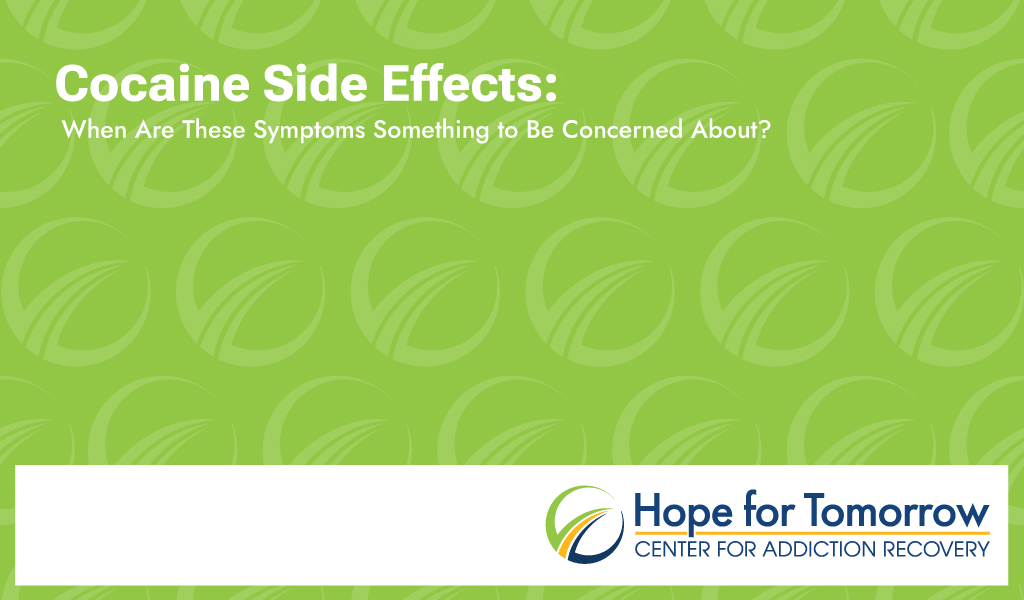

15% of Americans report using cocaine in their lifetimes, making it the third most common illicit substance in the country. Despite that, cocaine isn’t as talked about as it once was. That doesn’t mean its impact isn’t significant. Cocaine takes a toll on the health and lifestyles of West Virginians every day.
At Hope for Tomorrow, our highly qualified staff treats cocaine use daily, and we have seen firsthand how it’s impacting our community. More people knowing about cocaine’s side effects could save a life. Whether it be a matter of survival or a matter of watching everything important go down the drain due to addiction, education is key to providing the necessary support to those with cocaine use disorder.

Side effects of cocaine vary from person to person, influenced by how you use cocaine and your physiology. Everyone can tell you cocaine can cause physical health complications. What many don’t understand is the deep psychological component of cocaine use.
Cocaine functions by causing the brain to release a neurotransmitter associated with pleasure: dopamine. Dopamine naturally releases in response to something you’re excited about. Usually, the brain recycles that dopamine and reuses it later. Cocaine disrupts this process, causing a massive buildup of dopamine that then impacts the reward circuitry in your brain.
It’s common to use cocaine, experience a short “high,” and then use it again shortly after to extend the feeling. It creates a cycle of euphoria, followed by an intense crash in both energy and mood. The following psychological symptoms may appear:
Physical symptoms of cocaine use are:
The “high” that comes with cocaine differs based on whether you’re smoking crack cocaine, or inhaling powdered cocaine.
You can feel the effects almost immediately when smoking crack. The euphoria that comes with it lasts mere minutes – generally around 10.
Snorted cocaine’s effects manifest anywhere from 5-30 minutes after use. This “high” lasts around 20-30 minutes, though some physical effects might linger for days.
Cocaine can seem enjoyable at first, but it’s far too easy for life to spiral out of control.
Cocaine is a stimulant, so when you take it, it feels like it speeds up every process in the body. In some cases, it does: it increases heart rate, and raises blood pressure and body temperature. People with cocaine in their system talk faster, react faster, and think faster. They’re hyperactive, erratic, and have trouble sleeping.
The sought-after effects of cocaine are short-lived, though, and with the “crash” comes fatigue, low mood, paranoia, and anxiety that lasts far longer than cocaine’s favorable feelings.
With prolonged cocaine use, that “crash” turns into withdrawal, and a cocaine use disorder. The brain adjusts to the dopamine build-up, and naturally rewarding experiences don’t make you feel much at all. Instead, you might feel deeply depressed, anxious, and exhausted. You might have trouble sleeping, and experience disturbing dreams. The biggest threat that comes with withdrawal symptoms is the potential for suicidal ideation.
Cocaine still has a negative impact on the body, though. It can permanently change heart rhythms, and increase the likelihood of strokes, heart attacks, and coma. Those who inhale cocaine can experience permanent sinus problems, and people smoking it can damage their lungs. It’s possible to develop a chronic cough or asthma.
People with cocaine use disorders often experience financial difficulties due to spending money on cocaine. It can put a strain on relationships, and cause lost jobs and opportunities. It can impact every area of life.

Maybe you’re experiencing the consequences of cocaine use in your life, or you see them daily in someone you love. It can be hard to know what to do, especially if cocaine withdrawal makes doing much of anything seem like an insurmountable challenge. Whether you’re a concerned family member, are living with a cocaine use disorder, or are somewhere in between, cocaine addiction treatment can change your life.
Hope for Tomorrow is ready to provide the support you and your family need to overcome cocaine use disorder. We offer a variety of therapy options to address addiction and co-occurring mental health conditions, including family therapy to prompt healing for everyone involved. We’re here to help veterans, pregnant women, people with additional health complications, and anyone in need. Just give us a call at 877-679-8162.
Treatment today for a brighter tomorrow.